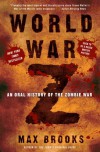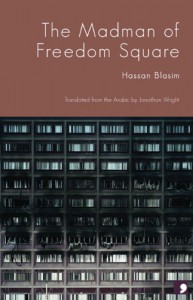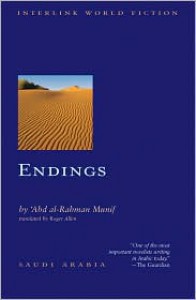Dangerous Women
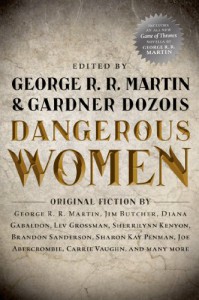 A bit too uneven an anthology to recommend wholeheartedly. I probably liked Brandon Sanderson's story the most; Abercrombie, Abbott, Lindholm, and (to an extent) Cadigan were also quite palatable. A few others (Martin, Grossman, Spector, Butcher) are likely to fall flat unless you're already familiar with the surrounding words / mythologies. Most of the rest, though, left me unimpressed; often less so with regard to the writing - which is serviceable throughout, with two or three exceptions - than with their authors' implied takes on the anthology's theme... which is polyvalent enough to lend itself to less, um, progressive interpretations of female (!) characters and gender relations as well. The best stories here manage to avert (or at least, problematize) the femme fatale, tomboy, etc. stereotypes, but most end up being rather conventional and not particularly exciting.
A bit too uneven an anthology to recommend wholeheartedly. I probably liked Brandon Sanderson's story the most; Abercrombie, Abbott, Lindholm, and (to an extent) Cadigan were also quite palatable. A few others (Martin, Grossman, Spector, Butcher) are likely to fall flat unless you're already familiar with the surrounding words / mythologies. Most of the rest, though, left me unimpressed; often less so with regard to the writing - which is serviceable throughout, with two or three exceptions - than with their authors' implied takes on the anthology's theme... which is polyvalent enough to lend itself to less, um, progressive interpretations of female (!) characters and gender relations as well. The best stories here manage to avert (or at least, problematize) the femme fatale, tomboy, etc. stereotypes, but most end up being rather conventional and not particularly exciting.
 1
1
The Burning Stone
 Raises the stakes quite a bit. It also embraces more straightforwardly (and organically!) the more fantastic elements scattered through the first two volumes in the series, which is all for the better - as the world itself finally "catches up" to the story's stretching out beyond the "alternate early medieval Europe" frame.
Raises the stakes quite a bit. It also embraces more straightforwardly (and organically!) the more fantastic elements scattered through the first two volumes in the series, which is all for the better - as the world itself finally "catches up" to the story's stretching out beyond the "alternate early medieval Europe" frame.
Consider the Lobster and Other Essays
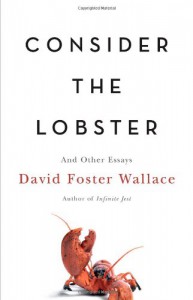 A bit uneven. DFW is of course at his best when describing the absurd byways of contemporary American society and culture (I enjoyed "Big Red Son", "Up, Simba" and "Host" most of what's in this collection), but I find I've grown a bit less patient with the often quite bland philosophizing that he seems to feel the need to inject (and that unfortunately forms the backbone of many of his other essays). Still very much above the cut, even though I wonder whether I'd be less forgiving if I didn't have good memories of reading (pretty much all of) his fiction.
A bit uneven. DFW is of course at his best when describing the absurd byways of contemporary American society and culture (I enjoyed "Big Red Son", "Up, Simba" and "Host" most of what's in this collection), but I find I've grown a bit less patient with the often quite bland philosophizing that he seems to feel the need to inject (and that unfortunately forms the backbone of many of his other essays). Still very much above the cut, even though I wonder whether I'd be less forgiving if I didn't have good memories of reading (pretty much all of) his fiction.
Buddha of Suburbia
 I'm not a big fan of coming-of-age novels more generally, but I enjoyed this one more than I expected. Very funny and very English, and at the same time often absolutely insane. The prose could be a bit smoother or more polished in places, and the second half kind of sizzles out - Kureishi feels much better portraying suburban life than he is the misadventures of young acting stars - but overall it works.
I'm not a big fan of coming-of-age novels more generally, but I enjoyed this one more than I expected. Very funny and very English, and at the same time often absolutely insane. The prose could be a bit smoother or more polished in places, and the second half kind of sizzles out - Kureishi feels much better portraying suburban life than he is the misadventures of young acting stars - but overall it works.
Iraqi Christ
 I found this collection a tad bit more uneven than Blasim's earlier Madman… some of the stories are quite "hit or miss", but there are still some pretty impressive pieces hidden here, especially in the first half of the book. I especially enjoyed "The Green Zone Rabbit" and "Dear Beto" - daring, complex, and haunting, which is Blasim at his best.
I found this collection a tad bit more uneven than Blasim's earlier Madman… some of the stories are quite "hit or miss", but there are still some pretty impressive pieces hidden here, especially in the first half of the book. I especially enjoyed "The Green Zone Rabbit" and "Dear Beto" - daring, complex, and haunting, which is Blasim at his best.
Silence & the Roar
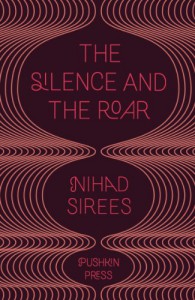 I quite liked this novel; it's rather funny, and provides a very urgent and very necessary view at the cracks that can always be found in oppressive regimes. That being said... I didn't find it entirely satisfying, mostly because I don't agree with the premise that laughter, comedy, etc. are a viable way of combating oppression and dictatorship - since cynicism may in fact be a constitutive way of how the novel's "roar" is in fact produced (are we seriously think people in the streets believe everything they chant), rather than being merely a hallmark of those who produce "silence". Sirees is probably aware of this to a certain extent, but I'd argue that it doesn't shine through enough in the novel; the sarcasm isn't quite sharp enough, the characters fall rather short of being delineated as people, all because they seem to be subjected to some sort of "intellectualist white-washing". The final effect is almost a bit elitist; it tinges of patronizing the roar of "the masses", and the awareness that cynicism in fact reaches beyond the better-off and the educated only comes out in a very subtle, very subdued manner.
I quite liked this novel; it's rather funny, and provides a very urgent and very necessary view at the cracks that can always be found in oppressive regimes. That being said... I didn't find it entirely satisfying, mostly because I don't agree with the premise that laughter, comedy, etc. are a viable way of combating oppression and dictatorship - since cynicism may in fact be a constitutive way of how the novel's "roar" is in fact produced (are we seriously think people in the streets believe everything they chant), rather than being merely a hallmark of those who produce "silence". Sirees is probably aware of this to a certain extent, but I'd argue that it doesn't shine through enough in the novel; the sarcasm isn't quite sharp enough, the characters fall rather short of being delineated as people, all because they seem to be subjected to some sort of "intellectualist white-washing". The final effect is almost a bit elitist; it tinges of patronizing the roar of "the masses", and the awareness that cynicism in fact reaches beyond the better-off and the educated only comes out in a very subtle, very subdued manner. Again, I'm quite sure Sirees is aware of the underlying issue; but I would find the novel much more effective if it stretched out for another hundred pages, and let the characters some more room to develop, and did away with the Kafka-esque pretensions which seem a bit out of place. Still, I quite liked it; it's well-written, and very Arab, and very necessary in the current moment, when the world's population in general (and not just the Arab Middle East) is being forced to re-think quite fundamentally their relationship with their states and regimes.
حين تركنا الجسر
 Awesome book - the ending may be a little underwhelming, but Zaki Nadawi is one of the strangest, most twistedly enjoyable characters in literature.
Awesome book - the ending may be a little underwhelming, but Zaki Nadawi is one of the strangest, most twistedly enjoyable characters in literature.
Babel-17
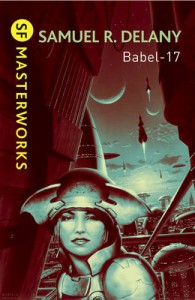 This is an excellent science fiction novel - the future world that Delany imagines is extremely vivid, creative, even realistic. And devoid of any kind of patronizing chauvinism, which is always refreshing. Even after almost half a century, it's hardly dated much... well, except for some of the linguistic infodumps, which might have seemed like cutting-edge stuff in the 60s; for a 21st-century reader, perhaps not as much. The linguistic musings are actually my biggest gripe with the novel, apart from the sometimes (but only sometimes) overwrought language; I wish there was a way of showing off Rydra's linguistic competence without her spouting out random bits of linguistic theory to people who couldn't possibly be expected to understand them... although that gets better in the second half of the book.
This is an excellent science fiction novel - the future world that Delany imagines is extremely vivid, creative, even realistic. And devoid of any kind of patronizing chauvinism, which is always refreshing. Even after almost half a century, it's hardly dated much... well, except for some of the linguistic infodumps, which might have seemed like cutting-edge stuff in the 60s; for a 21st-century reader, perhaps not as much. The linguistic musings are actually my biggest gripe with the novel, apart from the sometimes (but only sometimes) overwrought language; I wish there was a way of showing off Rydra's linguistic competence without her spouting out random bits of linguistic theory to people who couldn't possibly be expected to understand them... although that gets better in the second half of the book.It's a novel of ideas, more than plot or characters (although they do deserve honorable mentions for not being particularly clichéd)... and the basic idea behind the novel itself - that language can be used as a form of terrorism, since it exerts a deep and constitutive influence on how people think - I don't think it has been "disproven" at all. Delany might ostensibly (and consciously) be expounding the "strong S-W hypothesis", but even Whorf himself did not simply propose that "language influences thought". Rather, the specific ways in which languages "chop up" reality - that is, the ways in which we express things like number, shape, volume, etc. - differ in ways that lead us down specific habitual pathways of thought; that is, we make inferences on the basis of what our language tells us. There is no determinism; we are free to "think" as we wish. It's just that, because we usually talk about certain things in certain ways, we are more likely to mistake what is in fact an arbitrary linguistic decision - e.g., to mark a metal drum normally holding liquid petrol with no liquid petrol inside it as "empty", even though it is in fact "full" of petrol vapor - as a transparent representation of reality.
That, I believe, is why Rydra Wong is ultimately able to overcome the "linguistic terrorism" of the language she is analyzing: because she is a linguistic genius, she is able to overcome this illusion of transparency; and, hence, the only one able to de-activate the linguistic "weapon". Regardless of how flawed the explicitly stated theory of Delany's book might be, the underlying principle is sound: namely, that multi-lingualism needs to be valued not only for its practical or pragmatic use, but also for the fact that it enables us to "chop up" the world in different ways, and be aware of other possibilities of explicit conceptualization. None of this, of course, "prevents" or "determines" our thought; again, we are free to think whatever we wish, independently of language (but dependent, very probably on other factors). But we must not believe that, if we say something, that is a transparent representation of what we are describing.
There is no "plain" or "simple" language; every linguistic system is deeply arbitrary. And it pays to be aware of this, since it allows for empathy, but also greater flexibility of thought... which, in turn, equals new possibilities, intellectual progress, a better life for humanity. So even if the specific way in which the hostile language inside the novel works as a weapon may seem like a "misfire" (by the way, the only way this would work is if we accept that telepathy exists, plain and simple; and I don't think there's any way of simply reducing telepathy down to overlays of symbolic systems, as Delany tries to propose), the way in which it is combated is exemplary, and wholly in tune with Whorf's philosophy - which, quite unlike the "Strong Sapir-Whorf Hypothesis", does in fact hold, after a quick re-appraisal.
Of course, Babel-17 is also an awfully well-written novel, which always helps.
Snuff (Discworld 39)
 Nice read, but a bit too "safe" and formulaic (for anyone who's read any other Watch/Vimes books by Pratchett).
Nice read, but a bit too "safe" and formulaic (for anyone who's read any other Watch/Vimes books by Pratchett).
Orchard Keeper
 Not as exquisite as the later works (where his distinctive style is much more polished), but still an excellent read.
Not as exquisite as the later works (where his distinctive style is much more polished), but still an excellent read.
Outer Dark
 A very powerful novel... the symbolism gets a tad heavy-handed at times, but I still enjoyed it a lot. There are some genuinely comic moments that are simultaneously extremely dark, and other that are just plain horrifying.
A very powerful novel... the symbolism gets a tad heavy-handed at times, but I still enjoyed it a lot. There are some genuinely comic moments that are simultaneously extremely dark, and other that are just plain horrifying.
Mason & Dixon
 I liked this most of the books by Pynchon I've read so far. There's some genuinely beautiful writing in there, and the personal odysseys of the characters are all the more compelling for being refracted through a kind of mad inventive genius that is able to blend 'realism' quite seamlessly with the fantastic and supernatural. "Is able to"... but it doesn't always quite manage it: it isn't as compelling as it could be in some places, and there are quite a few scenes that still ring cheap and pretentious... but all in all, it seems to me to be a much more mature work than the other Pynchon novels I've read.
I liked this most of the books by Pynchon I've read so far. There's some genuinely beautiful writing in there, and the personal odysseys of the characters are all the more compelling for being refracted through a kind of mad inventive genius that is able to blend 'realism' quite seamlessly with the fantastic and supernatural. "Is able to"... but it doesn't always quite manage it: it isn't as compelling as it could be in some places, and there are quite a few scenes that still ring cheap and pretentious... but all in all, it seems to me to be a much more mature work than the other Pynchon novels I've read.And I particularly enjoyed that bit towards the end where Mason recounts his travel on a ship transporting lamb carcasses.
